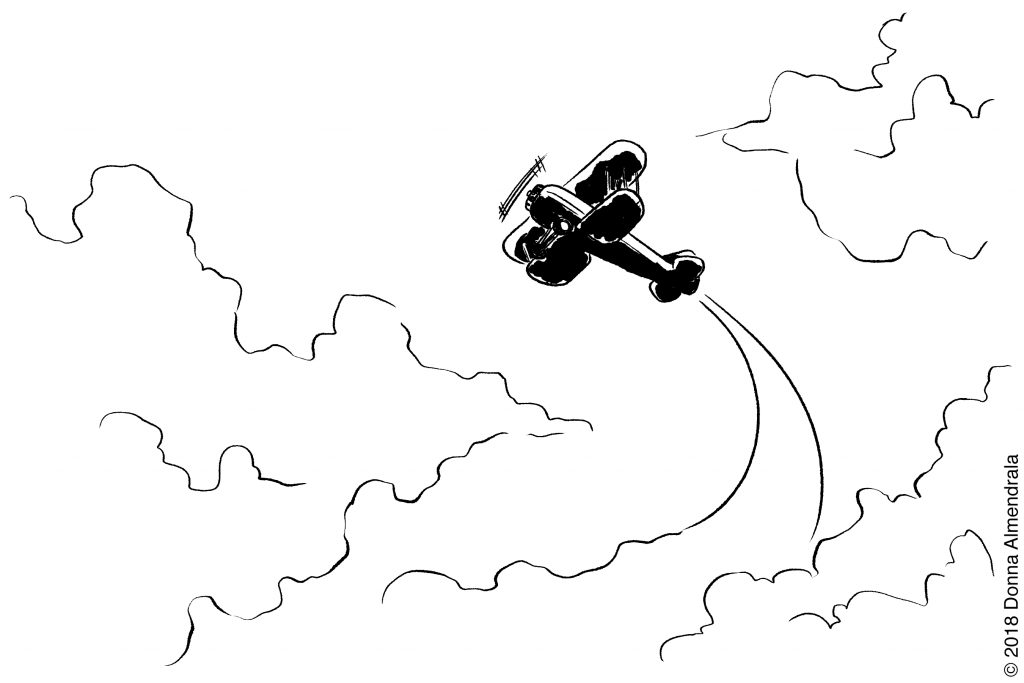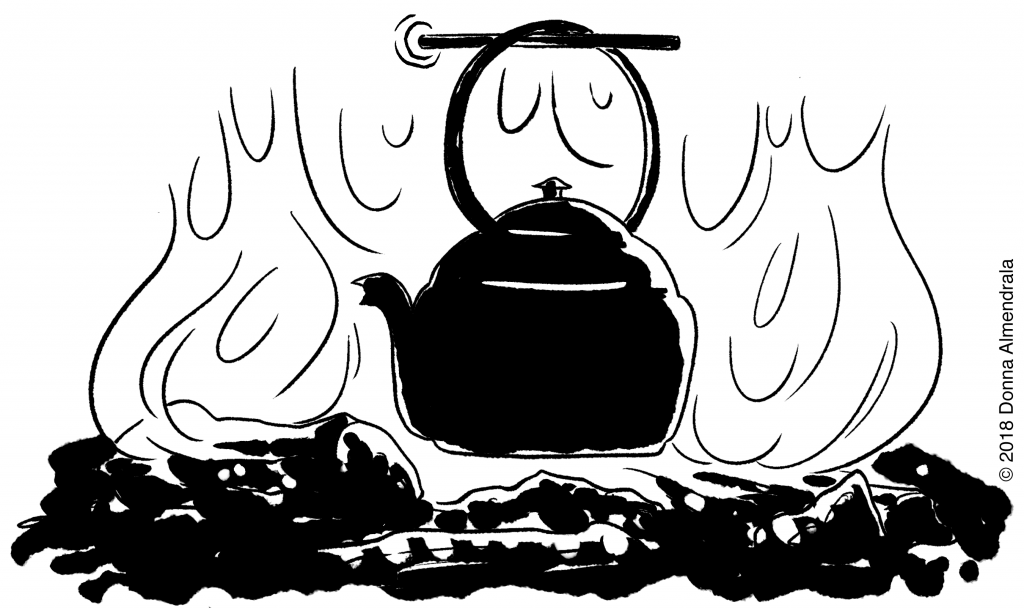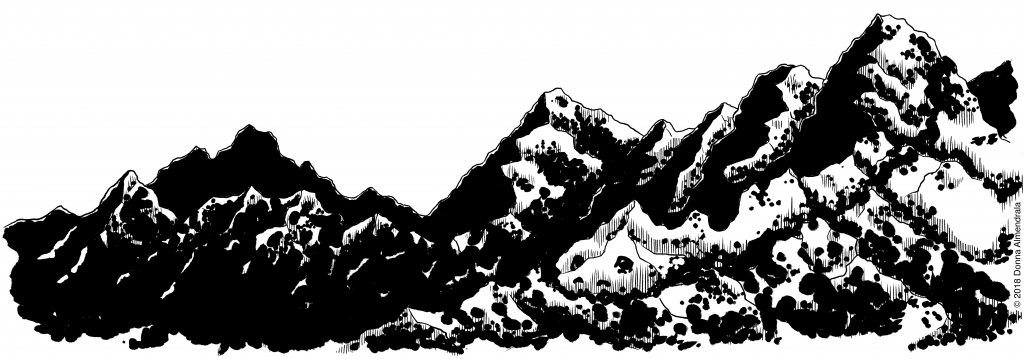
The opera music played from the man’s headphones as he and the woman hiked the gravel road next to a field of wheat. He was not talking to her because he was angry, and also because he liked how his music played as a blue and yellow airplane with a propeller dipped and rose overhead as if playing with the clouds, or dancing to his songs.
She walked a little bit ahead of him. He was angry because she had not looked at him in days, which told him something was wrong.
He listened and watched the plane and the clouds, which moved toward and covered mountains in the distance. Then a heavy rain came, and they hiked faster—almost a run—to a turn in the road that led to a farmhouse, which was built with a sloping red corrugated metal roof and a porch, or ‘stoep,’ as the people in this country called it.
Now landed, they saw a donkey pulling the airplane, and leading the donkey was a blonde boy—almost a man—wearing a blue jean jacket and a white scarf. His lips were blue from the cold, and he darted the two a quick glance and a wave of his arm before turning the donkey to the barn, which was also the airplane hangar.
The woman still did not look at the man, but she looked at the barn and at the house in the way that she did when she was thinking about only one thing.
‘We’ll stay here tonight,’ was all she said.
They went to the stoep and dropped their wet backpacks on the cement. The rain splattered on the metal, making thousands of echoes that filled the stoep, creating a distraction that made the silence between them a bit more bearable for the man.
‘That donkey gets so cross with the plane—pulls it as slow as a slug. He thinks it’s replacing him and his job, and I try to tell him that that’s nonsense, but he won’t listen.’ The boy stood in the rain next to the stoep with his flight goggles around his neck and his wrinkled leather boots in the mud. ‘Tea?’ He asked.
‘Yes, please,’ the woman said.
He led them inside where there was a large fire in a large fireplace, and before the fire there was a yellow wooden table. The boy poured a red tea from the fire’s kettle, and from the oven he pulled a tart that he dusted with cinnamon before cutting them each a large slice.
‘Rooibos and melk tert,’ he said, rolling his ‘r’s a bit.
The flames warmed them, and the tea glowed red. The fire blazed and the rain continued to splatter and to echo.

‘She still loves you,’ the boy said as he sat down. ‘Don’t worry—she’s only wearing a mask.’
The man looked up from his tea, and saw for the first time that the boy’s eyes were blue, like his jacket.
‘What? If I can tell what a donkey’s thinking about an airplane, I can tell what a human’s thinking about another human. Now, drink your tea—you both look like ghosts.’
The man looked at the woman, but she was staring into the fire.
There was a flash of lightning, and then a rumble. Outside the man could see the mountains for a moment before they vanished into the darkness.
‘It’s too bad—you just missed my pa. He went to the mountains this morning. He’s the one who told me about masks, and how we wear them when we’re afraid. The thing, he told me, is to not wear a mask for too long, or else you become the mask.’
‘Your pa sounds very smart,’ the man said.
‘Oh, he is! Very kind with strangers, too.’
The boy’s tea glowed a red light that changed his blue eyes into a yellow that matched the table. He smiled warmly at the two travelers. He had yet to take off his jacket, scarf, and goggles, but he had left his muddy boots on the stoep. He looked into his cup but did not sip from it.
‘When I was a boy I dreamed of flying that plane. It was all I wanted—to grow up and to fly, and to feel the wind in my face as I helped Pa with the farm, and did tricks in the sky. And I remember loving stories about dragons, and I imagined flying the plane with dragons that flew beside me, like snakes in the air—’
Then a wind howled outside and the fire went wild as air rushed down the chimney. The boy’s eyes shot to the fire, and as he closed his eyes and listened, two tears crawled steadily down his just-dried cheeks. He took a deep breath before speaking again.
‘Imagine my surprise when we found out that dragons are, well, really real. But angry, and big and black with horns and eyes of coal and mouths of fire. The whole thing, like in books.’
The woman looked at the boy. After many moments, she asked: ‘Why’s your father in the mountains?’
‘He went to talk to the dragon. He said the end would come—that unless he went and talked to the beast, to see if his anger was just a mask that he might take off—that there was no hope for the farm or our lives, which are the same things out here.’
‘And why are you still wearing your jacket and goggles?’
‘Because I have to go back to the plane. If my pa fails, the dragon will come for the farm, and I’ll have to defend it.’
The boy stood up then and walked to the door. ‘You can stay if you like, but maybe it’s not best.’ And then he vanished.
The woman stared at where the boy had been sitting, at his uneaten tart and full cup of tea. Then she looked at the man, and met his eyes. ‘Let’s get outta here,’ she said.
They hurried to the stoep and put on their backpacks. The rain came down harder than before, and the metallic echoes now sounded like machinegun fire. Through the din they heard the airplane’s engine somewhere overhead, and then there was another flash of lightning followed by a deep rumble that sounded like a roar. ![]()

